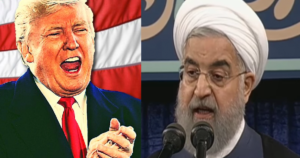Mr. Trump has gathered the hawkish cohort of advisors led by Secretary of State Mike Pompeo and the national security adviser, John R. Bolton to smoothen the internal resistance in his administration on the face of unreasonable policies. One of them appears in the form of US withdrawal from Iran Nuclear deal.
Joint Comprehensive Plan of Action (JCPOA) drawn and secured by P5+1 countries in 2015 was hailed as an excellent example of multilateral diplomacy. Imminently, it was considered a fruitful aversion to potentially calamitous new confrontation in the volatile and conflict-ridden Middle East region. Now the antennas in Washington sturdily indicate that the confrontation is likely to be back on track.
Mr. Obama laid out the comprehensive plan and carried a painstaking diplomatic work for successful negotiations with Iran. In the early 2000s, Britain, France, and Germany initiated negotiations with Iran and kept the US out. By October 2003, Iran suspended uranium enrichment. It was resumed again in 2006 under hard-line President Mahmoud Ahmadinejad. Immediately, Tehran was locked out of the global economy by World powers imposing crippling UN sanctions. Obama administration launched secret talks with Iran in Oman after President Hassan Rouhani took office. Eventually, the US and world powers reached the Joint Comprehensive Plan of Action with Iran.
Given its business interests, Iran appears to retain its criticism of the US, but won’t back out of the deal despite Mr. Trump’s withdrawal and offensive epithets to describe the agreement — “insane, the worst deal ever” etc. President Hassan Rouhani declared that the Iranians intended to abide by the terms of the deal while criticizing Trump for his history of not honoring international treaties. China and Russia are also signatories to the agreement and are likely to back Iran in accusing the United States of violating the multi-lateral accord.
Mr. Trump backed by Israel, and his administrative advisors and aides reasoned the deal in Iran’s favor. Because of Iran’s regional activities- geopolitical involvement in Yemen and Syria, missile tests, etc.- US administration decided to wreck the deal instead of opening up channels of dialogue with Tehran. All neutral observers expounded that clubbing together with other issues with a successful diplomatic agreement is not a canny foreign policy.
Besides, torpedoing the atomic deal may potentially transport the catastrophic implications in the region. Undeniably, the US pullout of JCPOA will weaken moderate Rouhani’s position in Iranian politics and likely strengthen hard-liners who the US believes candidly aspire nuclear weapons. It not only stimulates hard-line forces in Iran to go for a bomb but will also add to threats of Iranian retaliation against Israel. Multiple avenues might be cracked to fuel the grueling arms race in the Middle East. Apart from that, sectarian conflict from Syria to Yemen will be aggrandized in lethality and intensity.
Mr. Obama has also rebuked Mr. Trump’s move that “this withdrawal would leave the world less safe, confronting it with a losing choice between a nuclear-armed Iran or another war in the Middle East.” It also manifests the rationality Mr. Obama had while pursuing the successful diplomatic atomic deal venture with Iran.
Mr. Trump’s strategy of force is perhaps reinforced by the North Korea case he views as the success of his policy toward North Korea. He appeared to establish that- with the considerable amount of input by his hawkish team- his strategy of maximum pressure had forced Mr. Kim to the bargaining table. The exercise of the same policy of overwhelming pressure toward Iran would enable the US to extract a better deal from Iran.
However, Mr. Trump with his advisors seems unable to gauge the difference between North Korea and Iran in terms of domestic compulsions, global positioning and associated stakes of other countries as the announcement drew a chorus of opposition from European leaders.
Mr. Macron of France, Chancellor Angela Merkel of Germany and Prime Minister Theresa May of Britain in a joint statement pointed out that the United Nations Security Council resolution endorsing the nuclear deal remained the “binding international legal framework for the resolution of the dispute.” That raises the possibility that the United States will be found to be in violation of the Security Council. Moreover, the international regime against nuclear proliferation will be enervated more and more. These concerns profoundly demand the retention of the deal by other countries.

